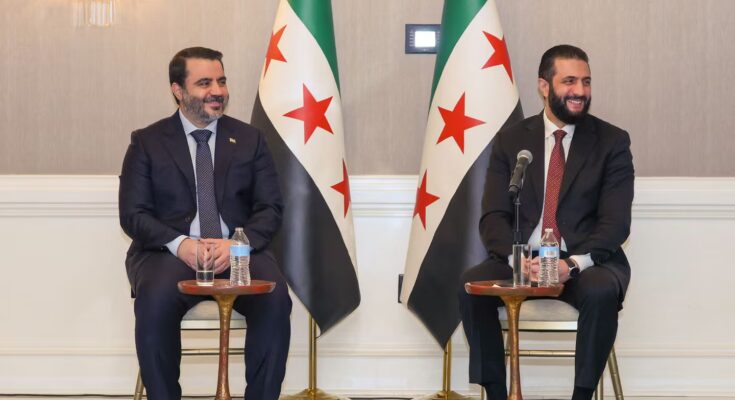Donald Trump received, Monday, November 10 at the White House, the transitional president of Syria, Ahmed Al-Charaa, who, in less than a year in power, has brought his country out of isolation. This visit comes six months after Donald Trump and Ahmed Al-Charaa met for the first time, in May in Saudi Arabia, where the American president traveled as part of a regional tour and on this occasion announced his desire to lift American sanctions targeting Syria.
Ahmed Al-Charaa arrived in Washington on Saturday with his Foreign Minister, Assad Hassan Al-Chibani. Since taking power in December 2024, Syria has shifted its position regionally, moving away from Bashar Al-Assad’s main allies – Iran and Russia – towards Turkey, the Gulf states and the United States.
This visit marked a diplomatic turning point for Syria, it was the first visit by a Syrian head of state since the country became independent in 1946, and was an investiture for the former jihadist. Syria’s new force should sign an agreement to join the international anti-jihadist coalition led by the United States, according to the American envoy to Syria, Tom Barrack. Although most American troops are based in Kurdish-controlled areas, opening a base at Mazzeh military airport, near the capital, would be a breakthrough.
Trump and Al-Charaa are also expected to discuss negotiations initiated by the Syrian government with Israel over a security agreement under which the Jewish state will withdraw from the southern regions of the country it occupied after the fall of Bashar Al-Assad. In their meeting in May, Donald Trump urged his Syrian counterpart to join the Abraham Accords, which saw several Arab countries recognize Israel by 2020.
Ahmed Al-Charaa’s offer came to fruition
Since taking power, Al-Charaa has broken with its past, increasing openness towards the West and regional countries, including Israel, with which it is theoretically at war. However, sectarian violence has rocked Syria since the fall of Bashar Al-Assad, with clashes leaving more than 2,500 people dead, reigniting the suffering of the civil war and raising doubts over the new leaders’ ability to govern all Syrians.
On Friday, the United States removed the Syrian leader from its terrorist blacklist. From 2017 until last December, the FBI offered a $10 million reward for information leading to the arrest of the leader of Al-Qaeda’s former local branch, the Hayat Tahrir Al-Sham (HTC) group. On Thursday, the UN Security Council lifted sanctions on Al-Charaa, at the initiative of the United States, welcoming the Syrian government’s commitment to do so. “fighting against terrorism”.
On Sunday, he met with the Managing Director of the International Monetary Fund, Kristalina Georgieva, and had discussions “potential areas of cooperation between Syria and the IMF to support development and economic growth in the country”according to the Syrian presidency. After thirteen years of civil war, Syria is seeking guaranteed funding for its reconstruction, the cost of which could exceed $216 billion, according to the World Bank.



